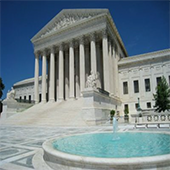ISGMH Celebrates Supreme Court Ruling Against LGBTQ Employment Discrimination
The Institute for Sexual and Gender Minority Health and Wellbeing (ISMGH) at Northwestern University celebrates the Supreme Court’s ruling in favor of workplace protections for lesbian, gay, bisexual, transgender, and queer (LGBTQ) employees. The 6-3 ruling states that the Civil Rights Acts of 1964 protects employees from being fired because of their gender or sexual orientation. For the first time in the country’s history, all LGBTQ people—regardless of what state they live in or where they work—have their right to work without discrimination protected by federal law.
the Supreme Court’s ruling in favor of workplace protections for lesbian, gay, bisexual, transgender, and queer (LGBTQ) employees. The 6-3 ruling states that the Civil Rights Acts of 1964 protects employees from being fired because of their gender or sexual orientation. For the first time in the country’s history, all LGBTQ people—regardless of what state they live in or where they work—have their right to work without discrimination protected by federal law.
This ruling will have a considerable impact on the lives and livelihoods of LGBTQ people around the country. For decades, LGBTQ people have been legally stripped of the ability to gain and retain employment, earn an income, provide for their families, and secure employer-provided healthcare because of their gender or sexual orientation. Transgender individuals have long borne the worst of this discrimination, facing lower employment rates, lower household income, and higher poverty rates than the general population. The ability to work without discrimination, harassment, and fear of being fired is essential for LGBTQ people to participate fully in the workforce. Importantly, employment is also linked to individuals' health and wellbeing.
This ruling comes at a particularly revealing moment, as the US finds itself in the midst of an unemployment crisis brought on by the COVID-19 pandemic—a crisis that leaves LGBTQ individuals especially vulnerable to unemployment. There is a great amount of work still left to be done to ensure that LGBTQ people can access, participate in, and benefit from fair and inclusive employment, but today the United States took an important step forward.
Especially fitting is the release of this ruling in June, Pride month, when we celebrate LGBTQ communities and remember the 1969 Stonewall riots that gave rise to the LGBTQ rights movement in the United States. It is impossible speak about the progress made today without also acknowledging the outsize role that transgender people of color, including Marsha P. Johnson and Sylvia Rivera, played in the Stonewall riots and our now decades-long fight for LGBTQ rights.
As we celebrate today’s victory, we also mourn the recent death of Aimee Stephens, the transgender woman who brought this, the first transgender rights case, to the Supreme Court, but did not live to see its outcome. We are indebted to her pioneering, courageous work which will benefit the US’s 8.1 million LGBTQ workers.